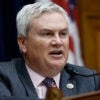Investigative tactics featured on CBS News’ “60 Minutes” bear an eerie resemblance to the undercover sting operation of a pro-life activist indicted last week for his role in secretly recorded videos in which Planned Parenthood officials talk about harvesting aborted babies for tissue and organs.
A report called “Anonymous Inc.,” which aired Sunday night, focused on an activist group’s hidden-camera footage of New York lawyers asked for help in money laundering by an investigator using a fake name.
>>> Indicted Activist Releases New Video, Wants to ‘Send Strong Message’
The report included audio and video excerpts of the meetings.
“60 Minutes” correspondent Steve Kroft reported that Global Witness, a London-based nonprofit that exposes international corruption, sent one of its investigators to law firms across Manhattan, posing as the representative of a poor West African country.
@60Minutes What's difference between STING & Planned Parenthood issue?
— steve katz (@katman1935) February 1, 2016
Its investigation was designed to raise red flags for the lawyers by revealing an intent to move questionable funds in the United States through purchases and other ways that would be concealed from law enforcement, Global Witness officials told Kroft.
Of 16 lawyers secretly recorded by the undercover investigator, only one outright declined to participate. The others suggested ways to help move the funds without compromising the true source, Kroft reported.
It was a familiar scenario. Only so far no one appears to be calling for Global Witness to be punished for surreptitiously trying to expose unethical or illegal activity.
By contrast, David Daleiden, founder of the pro-life Center for Medical Progress, last summer released a series of secretly recorded videos around the nation with officials of Planned Parenthood, the nation’s largest abortion provider.
In the videos, investigators using phony names posed as representatives of a research company wanting to buy tissue, organs and other body parts of aborted babies. In various ways, Planned Parenthood officials appeared to show a willingness to discuss prices and other terms for such transactions.
Such trafficking, as well as altering abortion procedures for profit, is illegal.
‘Gray Areas’
A grand jury in Harris County, Texas, last week found no reason to charge Planned Parenthood officials. But it indicted Daleiden on charges of “tampering with governmental records” by falsifying a California driver’s license and also “intentionally and knowingly” offering to buy human organs.
The grand jury also indicted Daleiden’s undercover colleague, Sandra Merritt, on a charge of tampering with a government record. Merritt posted bail Wednesday and Daleiden was expected to do the same Thursday.
The Center for Medical Progress released a new hidden-camera video Tuesday in which a Planned Parenthood official in Texas appears to discuss with Daleiden and Merritt how accounting can be manipulated to hide profits from the sale of organs and other body parts. The meeting was recorded in April in Houston, Daleiden’s group said.
“There are gray areas, and there’s a huge continuum when you’re doing something that might be undercover,” Mark Horvit, executive director of the group Investigative Reporters and Editors, told The Daily Signal when asked about the case. “But most news organizations wouldn’t let a journalist break the law to do undercover reporting.”
The series of videos released by the Center for Medical Progress won praise from pro-life activists and scorn from pro-choice activists. They put Planned Parenthood under a microscope and led to state investigations, withdrawal of state tax dollars and renewed debate in Congress over cutting off federal funding.
Planned Parenthood Federation of America denied wrongdoing, labeling Daleiden and the Center for American Progress as “anti-abortion extremists” who produced “heavily edited” video.
The abortion provider charged the Center for Medical Progress “had engaged in an elaborate, illegal conspiracy in order to block women’s access to safe and legal abortion.”
Daleiden pointed to a rich history of undercover journalism in America.
“The Center for Medical Progress uses the same undercover techniques that investigative journalists have used for decades in exercising our First Amendment rights to freedom of speech and of the press, and follows all applicable laws,” Daleiden said in a statement.
“We respect the processes of the Harris County district attorney, and note that buying fetal tissue requires a seller as well. Planned Parenthood still cannot deny the admissions from their leadership about fetal organ sales captured on video for all the world to see.”
60 Minutes on @CBS ,same strategy as @CtrMedProgress yet… #tcot #PlannedParenthood #RedNationRising #tcot pic.twitter.com/glrKSxA8tG
— ???????? (@SandraXFreedom) February 1, 2016
‘Great Public Consequence’
In the “60 Minutes” report on the Global Witness sting of New York lawyers, a founder of the organization tells Kroft why it was necessary to secretly record videos.
“This is real public interest information,” says Charmian Gooch, co-founder of Global Witness. “How are you gonna get that out to them if you can’t show them what’s happening behind closed doors?
Kroft asks Columbia University law professor Bill Simon about the ethics involved.
“Any lawyer’s gonna be uncomfortable about the fact that this was a sting in which someone lied his way into a lawyer’s office and secretly recorded statements a lawyer … thought he was making to a client,” Simon says.
The law professor adds: “So I’m a little uneasy about that. On the other hand, I think that the tapes expose conduct of great public consequence.”
Is it valuable for the public to see the footage? Kroft asks. Simon responds:
Yeah. I think it’s very valuable. Confidentiality is for the benefit of the client, not the lawyer. But the lawyers benefit from it because conduct that goes on under the protection of confidentiality is never scrutinized by the public. And lawyers are never accountable for it. So the sting actually brings some accountability to conduct that ought to be accountable.
“60 Minutes” did not respond to The Daily Signal’s requests for comment.
The Society of Professional Journalists, or SPJ, is known in part for its Codes of Ethics. Asked last week by The Daily Signal about the undercover Planned Parenthood videos, Jennifer Royer, a communications strategist for the journalist group, said only that it hopes news operations will follow that code in related matters.
The ethics code reads in part: “Avoid undercover or other surreptitious methods of gathering information unless traditional, open methods will not yield information vital to the public.”
@60Minutes So with them doing it undercover then they should be indicted based on the planned parenthood investigation
— Just A Common Man (@common_just) February 1, 2016
‘Impact Is the Point’
The Independent Journal Review on Friday listed five big stories in which journalists went undercover to do investigative reporting. Examples ranged from a reporter for the New York Tribune who in 1859 posed as a slave-buyer to expose the “evils of slavery” to Pamela Zekman, a Chicago Sun-Times reporter who exposed “abortion profiteers” in 1978.
Brooke Kroeger, a journalism professor at New York University who wrote the book “Undercover Reporting: The Truth About Deception,” maintains an online database on undercover reporting. She divides entries into “successes” and “lapses,” which is when a reporter or news organization crosses an ethical line.
Asked for comment Tueday on the Planned Parenthood videos, Kroeger referred The Daily Signal to an interview she did Friday with the podcast “On the Media.”
In the interview, Kroeger said undercover reporting shouldn’t be lost. “There are certain cases where it is really the way to get information out and to get action,” she said.
Kroeger also said she doesn’t think undercover reporting has to be the method of last resort, as the SPJ ethics code suggests.
“First of all, is it a big enough, important enough subject to warrant this kind of scrutiny?” Kroeger told “On the Media” host Brooke Gladstone. “Impact is the point.”
Not disclosing information isn’t necessarily lying, she said, and in undercover reporting it’s acceptable for a journalist to use another name.
‘Legal Wrangling’
From what she knows, Kroeger said, the Center for Medical Progress investigation probably would fall under the “lapses” category of her database “because of the method that was employed and the way it was executed, at least if the charges of the substantial editing turn out to be correct.”
Defenders of the pro-life group note, however, that by posting both edited and “raw” video of its undercover meetings with Planned Parenthood officials, the group revealed much more about the editing process than do media outlets from CBS News to Fox News Channel and The New York Times to The Wall Street Journal.
“I haven’t put any of this new material up,” Kroeger said of the Planned Parenthood scandal, “largely because there’s so much legal wrangling going on now. Let’s see how it plays out.”
Exactly what I've been thinking for the last 15 minutes. Literally, same investigative tactics, except CBS is a hero https://t.co/LUUEO7JGxx
— Kelsey Bolar (Harkness) (@kelseybolar) February 1, 2016
Horvit, the head of Investigative Reporters and Editors, told The Daily Signal:
At a news organization, if a story like this [Planned Parenthood sting] was being conceived and considered, there would be a great deal of talk about what you can and can’t do, what’s legal and what’s not, what lines can and should be crossed and what shouldn’t, what ethical decisions are OK, and what we can do ethically versus legally. …
Whether those conversations happened in this case with these folks, I have no idea. My take on this is that most, not all, but most news organizations would not go to the lengths that these folks went to to do what they did. Most news organizations probably wouldn’t let you create that fake driver’s license.
‘Positive Impact’
In 2014, Kroeger wrote a defense of undercover journalism for IRE Journal, published by Horvit’s group.
In one 16-month span ending in April 2014, the journalism professor says, she posted “42 significant new undercover investigations” on her database. She adds:
Over the years, my research has found hundreds of prestigious honors given for this kind of work. And little wonder. Historically, the best undercover reporting has had a positive impact: from heightened public awareness and calls for action to arrests, firings, legislation and institutional reform. …
The point is, undercover reporting has continued, ethical conundrums and all, in a steady and uninterrupted flow since at least the 1840s. …
It’s not hard to fathom why the appeal of undercover work remains strong. Like almost no other journalistic form, it gives reporters deep, unfiltered access to subjects, situations and institutions that are important but hidden from the public. It also permits the use of narrative storytelling techniques that can stir impassioned public response and thus encourage action from those in power. These are the best, if not the only, good reasons to undertake such a project.
Undercover operations that seek to uncover illegal practices should not be criminalized, argue Hans von Spakovsky and Andrew Kloster, legal fellows in The Heritage Foundation’s Edwin Meese III Center for Legal and Judicial Studies.
Von Spakovsky and Kloster insist Daleiden’s indictment “sets a terrible precedent,” writing last week in a commentary for The Daily Signal:
Over the past decades, there have been countless undercover video operations conducted by major news organizations at ABC, NBC, CBS, Fox News, CNN, and others, as well as local at news stations all over the country. Today, the Internet has made it possible for citizen-journalists and investigators to employ the same techniques to expose wrongdoing without the need for the major resources required by shows like CBS’s ‘60 Minutes.’ …
Should these individuals, reporters at major news operations, and citizen-journalists be treated as criminals or held civilly liable if they used a fake ID to expose wrongdoing? We should be encouraging undercover operations that root out illegal behavior, not criminalizing them.
https://twitter.com/lewandowskijohn/status/691994014053044224
‘Deeply Disturbing’
The Texas Press Association has not released an opinion on the implications that Daleiden’s indictment in that state has on undercover investigative journalism.
However, Sherry F. Colb and Michael C. Dorf, law professors at Cornell University who describe themselves as pro-choice, decry the prosecution of Daleiden and Merritt as “deeply disturbing” in a commentary Friday for CNN. They write:
Undercover exposés play a vital role in informing the American public of important facts that would otherwise remain hidden. … We are pro-choice, and we support the important work of Planned Parenthood, but we find the prosecution of these citizen journalists, however self-styled, deeply disturbing.
The legal action in Texas, they write, “seemingly overlooks the fact that Daleiden and Merritt were only posing as buyers [of aborted baby body parts] to expose what they believed was illegal conduct by others.”
The law professors add: “[T]he criminal prosecution of Daleiden and Merritt, even if they did break the law, could chill undercover journalists and activists everywhere.”
Ken McIntyre contributed to this report.
This article has been modified to correct an early version that said Sandra Merritt was charged with two offenses. She was charged with one.






























